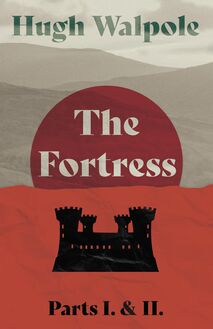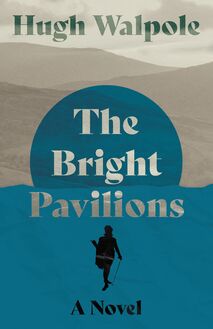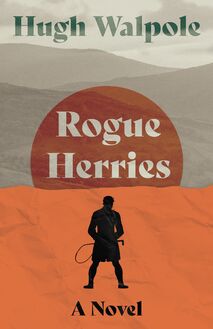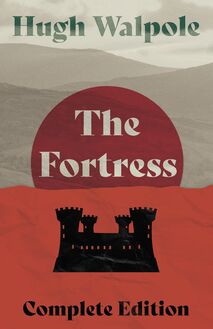-
 Univers
Univers
-
 Ebooks
Ebooks
-
 Livres audio
Livres audio
-
 Presse
Presse
-
 Podcasts
Podcasts
-
 BD
BD
-
 Documents
Documents
-
- Cours
- Révisions
- Ressources pédagogiques
- Sciences de l’éducation
- Manuels scolaires
- Langues
- Travaux de classe
- Annales de BEP
- Etudes supérieures
- Maternelle et primaire
- Fiches de lecture
- Orientation scolaire
- Méthodologie
- Corrigés de devoir
- Annales d’examens et concours
- Annales du bac
- Annales du brevet
- Rapports de stage
La lecture à portée de main
Vous pourrez modifier la taille du texte de cet ouvrage
Découvre YouScribe en t'inscrivant gratuitement
Je m'inscrisDécouvre YouScribe en t'inscrivant gratuitement
Je m'inscrisEn savoir plus
Vous pourrez modifier la taille du texte de cet ouvrage
En savoir plus

Description
Comedic and tragic, Judith Paris is the second volume in Hugh Walpole’s family saga, The Herries Chronicle.
Judith, daughter of Francis Herries and Mirabell Star, is an ambitious woman with a love for the Lake District’s gorgeous scenery and a burning desire for more than the countryside’s charm. She has her father’s pride and passion, and is determined to make a name for herself in the French capital. First published in 1931, this book explores life in revolutionary Paris.
Judith Paris has been republished by Read & Co. Books, and is the perfect family saga for fans of historical novels.
Sujets
Informations
| Publié par | Read Books Ltd. |
| Date de parution | 24 août 2022 |
| Nombre de lectures | 0 |
| EAN13 | 9781528797627 |
| Langue | English |
| Poids de l'ouvrage | 1 Mo |
Informations légales : prix de location à la page 0,0500€. Cette information est donnée uniquement à titre indicatif conformément à la législation en vigueur.
Extrait
JUDITH PARIS
A NOVEL
By
HUGH WALPOLE
First published in 1931
Copyright © 2022 Read & Co. Classics
This edition is published by Read & Co. Classics, an imprint of Read & Co.
This book is copyright and may not be reproduced or copied in any way without the express permission of the publisher in writing.
British Library Cataloguing-in-Publication Data A catalogue record for this book is available from the British Library.
Read & Co. is part of Read Books Ltd. For more information visit www.readandcobooks.co.uk
FOR J. B. PRIESTLEY
Contents
Hugh Walpole
A PREF ATORY LETTER
PART I
ROGUE'S DAUGHTER
FORECHAPTER
LI FE AT ULDALE
STONE ENDS
SUNWOODS IN COCKERMOUTH
FIREWORKS O VER THE LAKE
THE FUGITIVE
DE ATH OF DAVID
QUARRE L AND FLIGHT
MADAME PARIS
PART II
WATENDLATH
FRANCI S RIDES OVER
THE CRIMSON BIRD
HAPPINE SS IN LONDON
THE HERRIES BALL
MAY 17, 1796
THE HANGING
THE CLIPPING
THE OLD MA N OF THE SEA
TUMBL E DOWNSTAIRS
PART III
THE BIRD OF BRIGHT PLUMAGE
F AMILY PAPERS
ULDALE AGAIN
PAYING A CALL ON MRS. SOUTHEY
G ONE TO EARTH
G HOSTLY IDYLL
WILL HERRIES DINES AT WESTAWAYS
JUD ITH IN PARIS
PALAIS-ROYAL
PART IV
MOTHER AND SON
THE HILLS
JUDITH RETUR NS TO ULDALE
ROUND OF THE MOON
FRANC IS IN LONDON
SPRING 1821
MONEY
MOB
THE CHOICE
Hugh Walpole
Hugh Seymour Walpole was born in Auckland, New Zealand in 1884. He was educated at a series of boarding schools in England, followed by Emmanuel College, Cambridge. Walpole’s father hoped he would follow him into the clergy, but after three years as a missionary, in 1909, Walpole resolved to become a man of letters. His first commercial success came in 1911 with the novel Mr Perrin and Mr. Traill , after which Walpole made the acquaintance of writers such as Henry James and Joseph Conrad, and declared his ambition to become the greatest writer of his era. For the rest of his life, Walpole wrote prolifically. During the twenties he produced more than a novel a year, with The Cathedral (1922) and Wintersmoon (1928) proving to be great successes. In 1930, he began his most popular series of novels with the historical romance Rogue Herries , following it with Judith Paris (1931), The Fortress (1932) and Vanessa (1933). Eventually, he amassed an oeuvre of 36 novels, five volumes of short stories, two plays and three volumes of memoirs. He died in 1941, aged 57. Despite the fact that Walpole sold enormously well on both sides of the Atlantic, and was praised by many of his contemporaries, he is somewhat forgotten now, in part because he was overshadowed by P. G. Wodehouse and others.
A PREFATORY LETTER
My dear Jack,
There is in general no reasonable excuse for burdening a novel with a Preface or any sort of statement; a novel should show in itself its purport without outside emphasis. But, after the publication of Rogue Herries , I saw that with the next 'Herries' volume there must be a note of explanation. And for th ese reasons:
First: when a reader sees another instalment of Herries history he may think it necessary that he should read the first in order to understand the second.
Secondly: after Rogue Herries had made some friends it was in some places assumed that ' now , of course, I would writ e a sequel.'
And thirdly: the principal criticism of Rogue Herries was on the ground of its diffuseness.
I must explain then that, firstly, the story of Judith Paris may be followed without any knowledge of her father or curiosity as to her descendants. Then, far from considering a sequel to Rogue Herries for the first time after its publication, I must here confess that I had, more than twenty years ago, the plan of writing the history of an English family that should cover two hundred years and that should have, throughout, the same English scene for its centre. This was, I think (although Mr. Galsworthy may correct me), before the later Forsytes were thought of, or any suspicion of Sagas hung in the l iterary air.
Thirdly, I hope that when any who are interested realise (possibly with dismay and indignation) that there are to be, in all, four volumes of Herries history, certain details and characters will not seem so unnecessary, nor certain scenes so diffuse.
I would like, very modestly, to defend the fact that I write, and must write, from my own point of view. I can see that the Herries family offers, in its history, subject-matter for every kind of historian. But my view of the Herries in these volumes is frankly a r omantic one.
Every historian, whether of a country or a family, is compelled by his temperament to his own individual vision. I can see that there is a Herries history that is realistic, one that is comic, one that is scientific. Any of these might be more broadly convincing than my own, but I must mix my own colours and stand by the result.
As to diffuseness, compression in such a scheme as this is not easy. I might have written a novel, a long one too, only about Jennifer. Even with Judith I have been compelled to squeeze ten years of her life into one chapter. Those ten years could well be the subject of another novel. The Rockages at Grosset fascinate me, but my theme compels me to keep them minor. And how much more I know about Georges Paris in London or Charlie Watson in Watendlath than I have sp ace to tell!
Every scene and character has been deliberately chosen by me because of the book's continuous theme. At the awful word 'Theme,' however, I feel that I am growing altogether too serious and solemn.
My intention is simply to record scenes from the life of an English family during two hundred years of English change and fortune, and beyond that to pay a tribute to a part of England that I dearly love.
Judith Paris may be read as a quite independent novel, but the four books are seen together in my mind as a piece of gaily-tinted tapestry worked in Engl ish colours.
Affectionately yours, Hugh Walpole.
I have kept my faith, though faith was tried,
To that rock-born, rock-wandering foot,
And the world's altered since you died,
And I am in no good repute
With the loud host before the sea,
That think sword strokes were better meant
Than lover's music—let that be,
So that the wandering foot's content.
W. B. Yeats
P ART I
ROGUE'S DAUGHTER
F O RECHAPTER
The old woman and the new-born child were the only living things i n the house.
The old woman, Mrs. Henny, had finished her washing and laying-out of the bodies of the child's father and of the child's mother. She had done it alone because she had been afraid to leave the house with no one alive in it save the new-born child. Now she was exhausted and, in spite of her labour, fearfully chilled, for the snow, although it fell now more lightly, was piled high about the doors and windows as if, with its soft thick fingers, it wished to strangl e the house.
She was very cold, so she drank some gin, although it was not as a rule her weakness. The bodies of Mr. and Mrs. Herries lay, the eyes decently closed, the pale hands folded, each in its proper bed.
A fine heat burnt through Mrs. Henny's old body. The gin was good. Then her head fell forward an d she slept.
The old house rattled and squealed in the wind that was rising up now that the snow had almost ceased to fall. Feet seemed to creep up and down the stairs, fingers were at the windows, but the dead and Mrs. Hen ny slept on.
Th en, in the room where the old woman, the child, and its mother were, from the window a piece of glass, very old and dark green like weeded water, was loosened with the wind and fell tinkling to the boards. The snow blew in like a live thing and the room was ic ily chilled.
The child that had been sleeping felt the cold and began to cry, a shrill cry on one note. But Mrs. Henny heard nothing, the gin holdi ng her fast.
Squire Gauntry—little Tom Gauntry—riding along the Borrowdale path just below the house on the farther side of the little bridge, heard the cry. It was strange that from so weak a creature the cry should be so clear. He heard it, and he pulled up his horse; the six hounds who were with him stopped also. The snow had but just ceased to fall and for the first time that day. It was so unusual in that country for there to be so heavy a fall that he halted and looked about him in wonderment. The roofs of Rosthwaite, all the hills, the fields were buried in the white smooth covering, and now, for the first time, light began to break through. The grey stuff of the snowy sky was torn and a faint green field spread over the dim hills, and the snow began shyly to sparkle. The wind blew the top of the snow into little smoking spirals. Some rooks flew, like black leaves, cawing, breaking the sacred silence. The green f ield spread.
Herries, the house, raised on its little hill, to Gauntry's right, seemed to be overwhelmed by the snow, huddled, shapeless, helpless, and out of that whi te shapelessness this thin, desolate, tiny cr y continued.
Gauntry was eager to be home; his high black riding-coat was heavy with snow, he was weary and chilled, but there was something in that cry that moved him. A hard-bitten little man, leading always his own life and telling everyone else to go to the devil, nevertheless he was sentimental too: so he turned his horse, crossed the bridge over the stream, and, followed by the six hounds, guided the animal through the snow, and, striking with his whip on the gate of the courtyard, holloaed three times.
There was no answer at all. The silence settled down again. There was no sound but the thin persisting cry. He hesita
-
 Univers
Univers
-
 Ebooks
Ebooks
-
 Livres audio
Livres audio
-
 Presse
Presse
-
 Podcasts
Podcasts
-
 BD
BD
-
 Documents
Documents
-
Jeunesse
-
Littérature
-
Ressources professionnelles
-
Santé et bien-être
-
Savoirs
-
Education
-
Loisirs et hobbies
-
Art, musique et cinéma
-
Actualité et débat de société
-
Jeunesse
-
Littérature
-
Ressources professionnelles
-
Santé et bien-être
-
Savoirs
-
Education
-
Loisirs et hobbies
-
Art, musique et cinéma
-
Actualité et débat de société
-
Actualités
-
Lifestyle
-
Presse jeunesse
-
Presse professionnelle
-
Pratique
-
Presse sportive
-
Presse internationale
-
Culture & Médias
-
Action et Aventures
-
Science-fiction et Fantasy
-
Société
-
Jeunesse
-
Littérature
-
Ressources professionnelles
-
Santé et bien-être
-
Savoirs
-
Education
-
Loisirs et hobbies
-
Art, musique et cinéma
-
Actualité et débat de société
- Cours
- Révisions
- Ressources pédagogiques
- Sciences de l’éducation
- Manuels scolaires
- Langues
- Travaux de classe
- Annales de BEP
- Etudes supérieures
- Maternelle et primaire
- Fiches de lecture
- Orientation scolaire
- Méthodologie
- Corrigés de devoir
- Annales d’examens et concours
- Annales du bac
- Annales du brevet
- Rapports de stage














